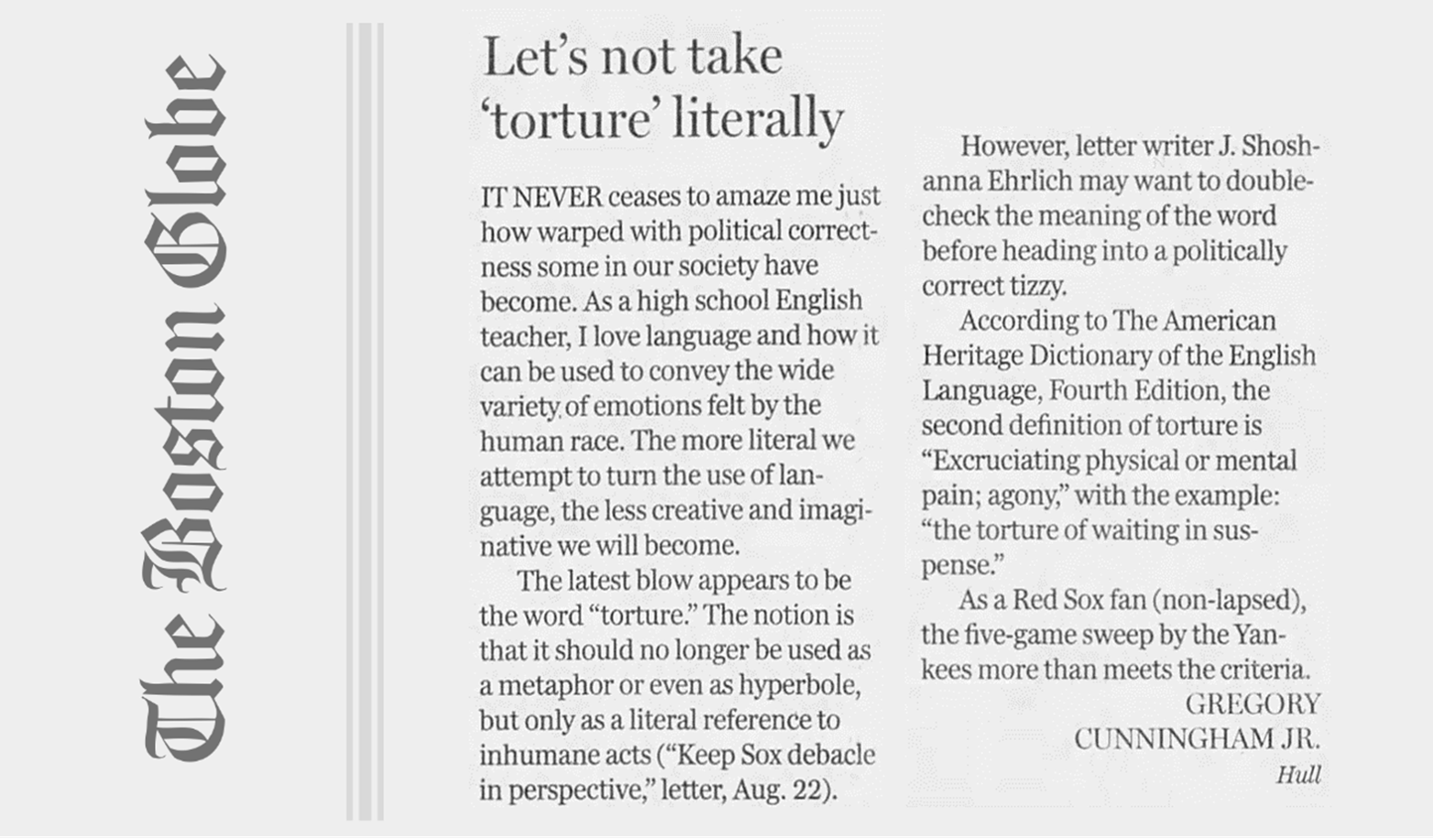What did he say and When did he say it? And what did he mean?
By Greg Cunningham, Blended Learning Specialist
When I read recently that UMass Amherst football coach Mark Whipple had been suspended for using the word “rape” in a press conference, a burst of memory went off in my mind. I flashed back to the high school cafeteria line where a classmate blurted “I just got raped by that calculus test.” No one blinked. My first thought was not about his choice of words, but my GPA. His grades in calculus were usually higher than mine; if he had done poorly, my grade would probably be zero.
That memory set me thinking about the peculiar speech patterns that developed in high school, words and phrases that were endemic to a particular school. At my school, rather than ask “Pass me a piece of paper” we would say “Paper me!” This phrase once led to a rather awkward moment in the cafeteria line when someone who wanted a carton of milk yelled to a friend “Milk me!”
Words matter. Words embody ideas; they are the tools we use to communicate our thoughts. But their denotative and connotative meanings can be tricky. No sooner had my high school flashback faded than I remembered a Boston Globe headline from 2006:

A letter to the editor a few days later complained about the word “torture.” The writer said that the word should only be used to describe “an inexcusable abuse of power” and not the events of a mere baseball game. I was confident that scores of Red Sox fans would have defended the use of that word for many Sox games.
Not only do definitions matter, but the intent of a word use also matters. The denotations and connotations of words change over time, sometimes explicitly, sometimes implicitly. Those changed meanings can create awkward moments, and worse. One merely needs to pick up a book from the 19th century to encounter words which, if uttered today, would turn heads, cause pain and likely cost someone their job. Mark Twain captured a period in our culture through the use of vernacular that would land him in a courtroom today.
Speaking of vernacular, I did some research on the Whipple case. His exact post-game remarks, according to multiple media reports, were “We had a chance there with 16 down and they rape us, and he picks up the flag.” Later in the interview, he referred to being “mugged” by the referee on the same play.
Were his word choices the best he could have made? The #MeToo movement has sensitized everyone to words that offend or threaten, whether or not the speaker so intended. We know the primary definition of the word “rape.” It is obviously not what occurred on that football field. I looked up alternate definitions in the Merriam-Webster online dictionary and found “an outrageous violation” and “an act or instance of robbing or despoiling or carrying away a person by force.”
That second definition is labeled archaic, but not the first. Did Coach Whipple feel that the referee’s call was an outrageous violation? Was he insensitive in using a red flag word in these highly charged times, even if, in the heat of the moment, it seemed to capture the violation he felt? The school determined that a one-week suspension was commensurate with his lack of sensitivity. The dictionary was irrelevant: in public discourse, connotation always trumps denotation. Context is everything. The coach was a public figure, speaking in a public setting. After review, the ruling on the field was confirmed: he had stepped out of bounds.
The incident raises a thorny point that applies to public discourse, classroom practice and even private conversation. How and when do words become so offensive that they should be avoided in certain contexts or altogether? When and where can we use a quotation that includes a word that is currently offensive but was not in its time? Think of Twain, Conrad, Pope. Or, conversely, words that are now acceptable but were not in their time: Joyce, Lawrence, Miller. And what about Eulalie Mackecknie Shinn’s litany of literary shame in The Music Man: “Chaucer… Rabelais…Bal-zac.”
A student recounted just such an impasse that occurred in a recent college class discussion. He had cited an archival article that referred to “American Indians” in the title. The instructor stopped him immediately and corrected the phrase to “Native American.” “But it’s a primary source,” the student protested. “It’s the title.” “Yes,” insisted the instructor, “but it should be Native American.”
I wondered how this instructor would handle a discussion of major league baseball in Cleveland. Or football in Washington DC and Kansas City. Or National League baseball in Atlanta, and in Boston before 1952.
Which brings us back to that Red Sox headline. The letter-writer’s complaint touched a nerve and a few days later the following rejoinder appeared in the Globe Letters to the Editor:

Words always matter. Words are potent capsules of thought imbued with intention and stamped by history. Language contains and preserves history. As Orwell warned, control of language is control of thought. History can be obliterated by purging language. We know what happens to cultures that forget their history. Or have we already forgotten?
I stand firmly by my 2006 position. Yes, we need to be sensitive to current sensibilities, but we also need all the words the language offers to understand and describe the complexities of the world around us, not to mention the world within. And the Red Sox are still quite capable of inflicting excruciating pain and agony.
Related content: The Choice of Presence





